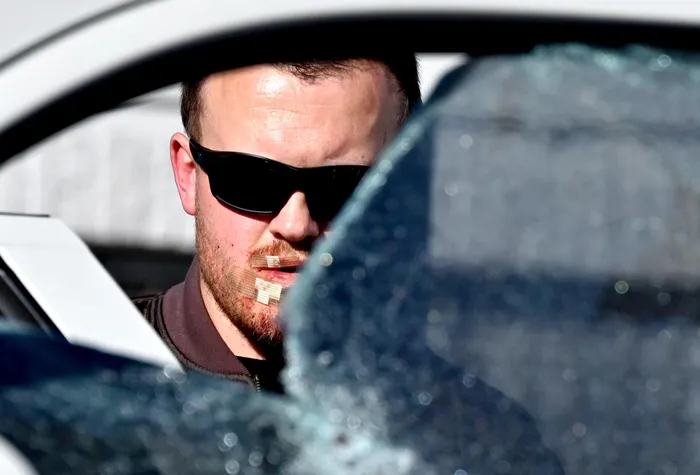
Portfolio Committee on Police Chairperson Ian Cameron, together with colleagues Lisa Schickerling and Nicholas Gotsell, were travelling near the intersection of New Eisleben and Govan Mbeki roads when unknown suspects broke the windows of their vehicle and began throwing bricks at them.
Image: Ayanda Ndamane / Independent Media
THE breakdown in relations between police and communities is a product of the glaring disparities in resource allocation which became evident during the recent attack of three DA MPs in Philippi.
It only took officers hours to track down and arrest the suspects behind the brazen attack on Ian Cameron, Lisa Schickerling and Nicolas Gotsell who were returning from an oversight visit at the Philippi training academy.
One of the suspected attackers, an 18-year-old, was arrested when he sought medical attention in hospital for a gunshot wound he sustained during the incident. Cameron has confirmed using his firearm in self-defence.
The second suspect, aged 16, was arrested soon after thanks to increased resource allocation, including the intervention of national police commissioner Fannie Masemola.
While commendable, the police’s swift response cannot go without scrutiny. Philippi has become a no-go area for e-hailing drivers and other delivery businesses.
Here residents live at the mercy of extortionists, who not only target small businesses but sometimes individual households as well. We have received reports of people being forced to pay ‘protection fee’ for their TV sets and other valuable household items. Refusal to pay can be fatal.
Reporting these crimes often results in reprisal, therefore residents opt to take the law into their own hands. For them vigilante justice is the most effective way to deal with crime.
We have seen this elsewhere in the country especially in townships such as Umlazi in KwaZulu Natal, Orange Farm in Johannesburg and Mdantsane in East London.
The situation is worsened when police demonstrate that they can effectively respond to crime, but only when it involves high-profile people.
A policing system that chooses when to be effective only widens the trust deficit between police and the communities. It sends a message that poor people are not entitled to safety in their communities.
It’s an injustice to the victims of crime, whose cases have been dragging for years with no progress. Expect more vigilantes when policing betrays the very same people it is supposed to protect.
CAPE TIMES